Comprehensive Report: Shell's Social Impact in Nigeria's Niger Delta
VerifiedAdded on 2020/04/13
|16
|4044
|48
Report
AI Summary
This report analyzes the social impacts of Royal Dutch Shell plc's oil operations in Nigeria's Niger Delta region. It investigates the effects of the company's activities on local communities, focusing on environmental pollution, corruption, and political instability. The research employs a combination of primary and secondary methods, including questionnaires, interviews, and existing data analysis. The report explores issues such as oil spillages, lack of accountability, and the company's relationship with the local population. The findings reveal the extent of social injustices, environmental degradation, and political unrest associated with Shell's operations, highlighting the need for improved corporate social responsibility and accountability. The report provides a detailed overview of the study objectives, literature review, research methodology, results, and conclusions, offering a comprehensive understanding of the complex social dynamics in the Niger Delta.
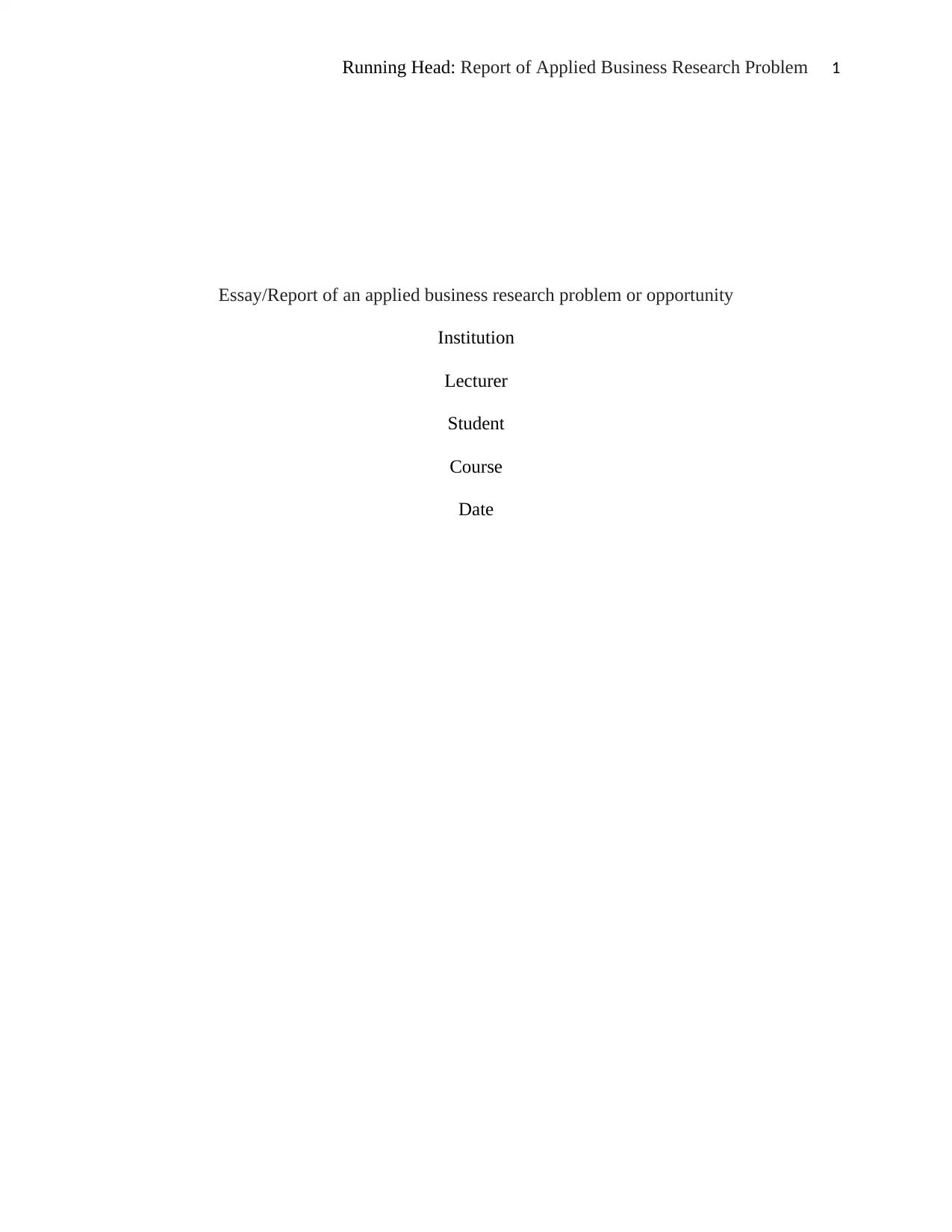
Running Head: Report of Applied Business Research Problem 1
Essay/Report of an applied business research problem or opportunity
Institution
Lecturer
Student
Course
Date
Essay/Report of an applied business research problem or opportunity
Institution
Lecturer
Student
Course
Date
Paraphrase This Document
Need a fresh take? Get an instant paraphrase of this document with our AI Paraphraser
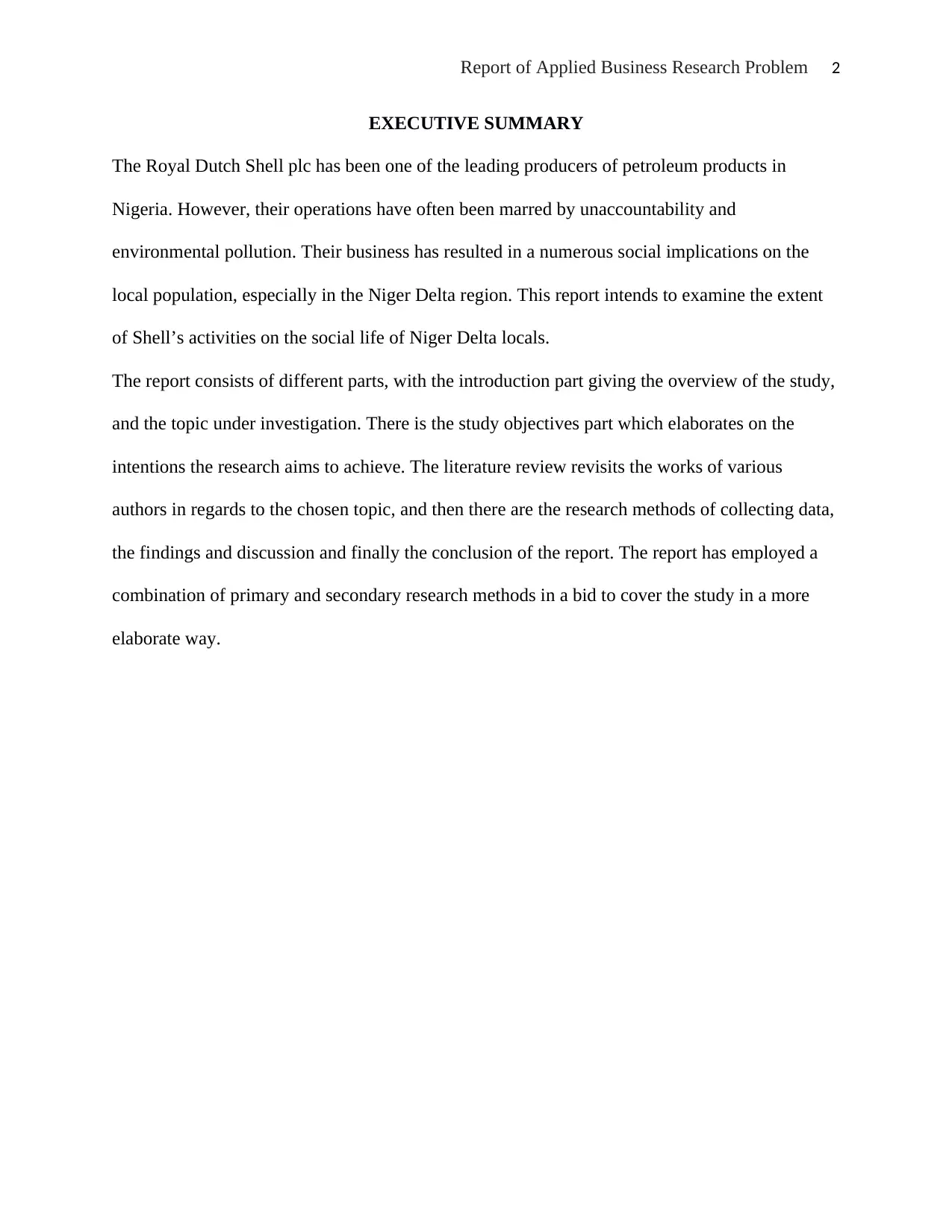
Report of Applied Business Research Problem 2
EXECUTIVE SUMMARY
The Royal Dutch Shell plc has been one of the leading producers of petroleum products in
Nigeria. However, their operations have often been marred by unaccountability and
environmental pollution. Their business has resulted in a numerous social implications on the
local population, especially in the Niger Delta region. This report intends to examine the extent
of Shell’s activities on the social life of Niger Delta locals.
The report consists of different parts, with the introduction part giving the overview of the study,
and the topic under investigation. There is the study objectives part which elaborates on the
intentions the research aims to achieve. The literature review revisits the works of various
authors in regards to the chosen topic, and then there are the research methods of collecting data,
the findings and discussion and finally the conclusion of the report. The report has employed a
combination of primary and secondary research methods in a bid to cover the study in a more
elaborate way.
EXECUTIVE SUMMARY
The Royal Dutch Shell plc has been one of the leading producers of petroleum products in
Nigeria. However, their operations have often been marred by unaccountability and
environmental pollution. Their business has resulted in a numerous social implications on the
local population, especially in the Niger Delta region. This report intends to examine the extent
of Shell’s activities on the social life of Niger Delta locals.
The report consists of different parts, with the introduction part giving the overview of the study,
and the topic under investigation. There is the study objectives part which elaborates on the
intentions the research aims to achieve. The literature review revisits the works of various
authors in regards to the chosen topic, and then there are the research methods of collecting data,
the findings and discussion and finally the conclusion of the report. The report has employed a
combination of primary and secondary research methods in a bid to cover the study in a more
elaborate way.
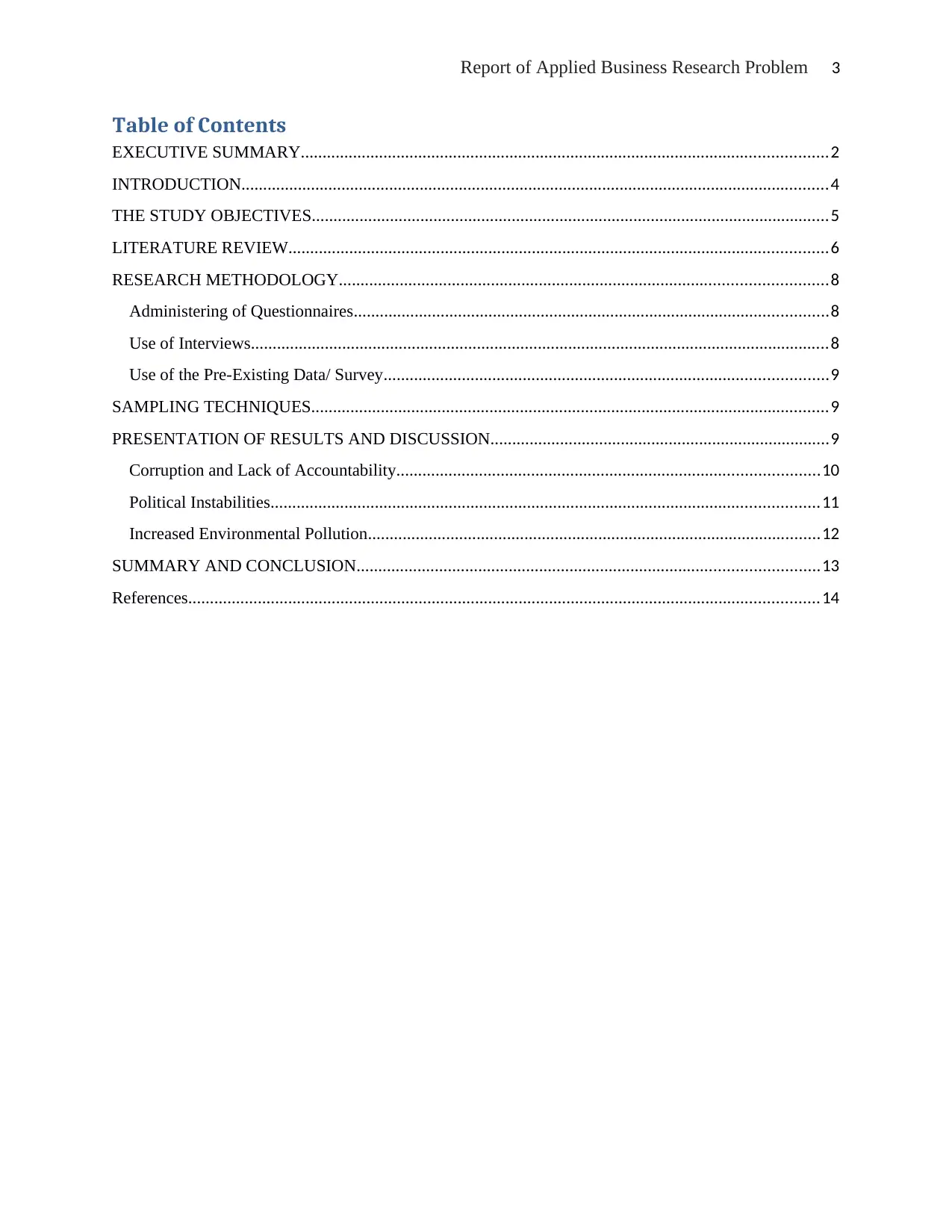
Report of Applied Business Research Problem 3
Table of Contents
EXECUTIVE SUMMARY.........................................................................................................................2
INTRODUCTION.......................................................................................................................................4
THE STUDY OBJECTIVES.......................................................................................................................5
LITERATURE REVIEW............................................................................................................................6
RESEARCH METHODOLOGY................................................................................................................8
Administering of Questionnaires.............................................................................................................8
Use of Interviews.....................................................................................................................................8
Use of the Pre-Existing Data/ Survey......................................................................................................9
SAMPLING TECHNIQUES.......................................................................................................................9
PRESENTATION OF RESULTS AND DISCUSSION..............................................................................9
Corruption and Lack of Accountability.................................................................................................10
Political Instabilities..............................................................................................................................11
Increased Environmental Pollution........................................................................................................12
SUMMARY AND CONCLUSION..........................................................................................................13
References.................................................................................................................................................14
Table of Contents
EXECUTIVE SUMMARY.........................................................................................................................2
INTRODUCTION.......................................................................................................................................4
THE STUDY OBJECTIVES.......................................................................................................................5
LITERATURE REVIEW............................................................................................................................6
RESEARCH METHODOLOGY................................................................................................................8
Administering of Questionnaires.............................................................................................................8
Use of Interviews.....................................................................................................................................8
Use of the Pre-Existing Data/ Survey......................................................................................................9
SAMPLING TECHNIQUES.......................................................................................................................9
PRESENTATION OF RESULTS AND DISCUSSION..............................................................................9
Corruption and Lack of Accountability.................................................................................................10
Political Instabilities..............................................................................................................................11
Increased Environmental Pollution........................................................................................................12
SUMMARY AND CONCLUSION..........................................................................................................13
References.................................................................................................................................................14
⊘ This is a preview!⊘
Do you want full access?
Subscribe today to unlock all pages.

Trusted by 1+ million students worldwide
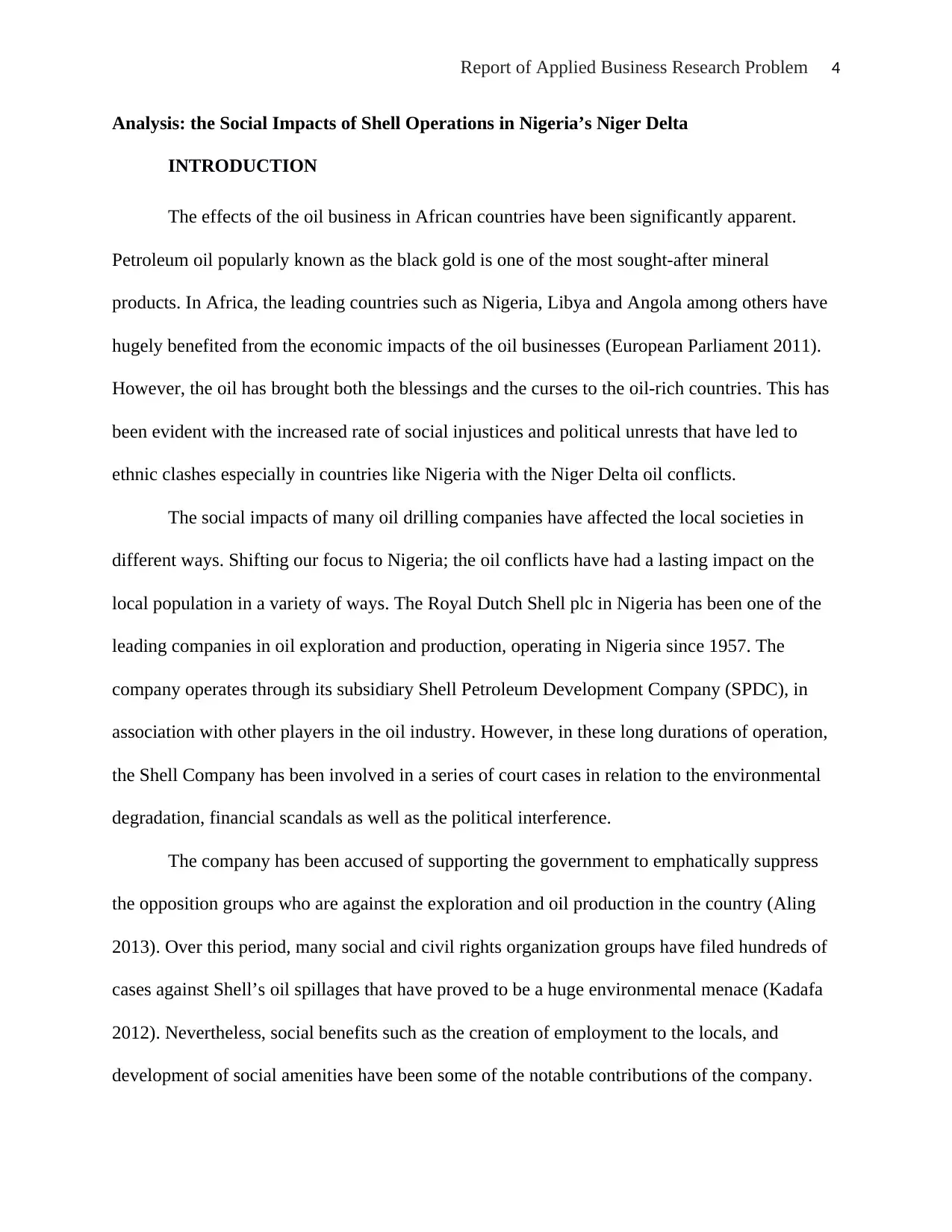
Report of Applied Business Research Problem 4
Analysis: the Social Impacts of Shell Operations in Nigeria’s Niger Delta
INTRODUCTION
The effects of the oil business in African countries have been significantly apparent.
Petroleum oil popularly known as the black gold is one of the most sought-after mineral
products. In Africa, the leading countries such as Nigeria, Libya and Angola among others have
hugely benefited from the economic impacts of the oil businesses (European Parliament 2011).
However, the oil has brought both the blessings and the curses to the oil-rich countries. This has
been evident with the increased rate of social injustices and political unrests that have led to
ethnic clashes especially in countries like Nigeria with the Niger Delta oil conflicts.
The social impacts of many oil drilling companies have affected the local societies in
different ways. Shifting our focus to Nigeria; the oil conflicts have had a lasting impact on the
local population in a variety of ways. The Royal Dutch Shell plc in Nigeria has been one of the
leading companies in oil exploration and production, operating in Nigeria since 1957. The
company operates through its subsidiary Shell Petroleum Development Company (SPDC), in
association with other players in the oil industry. However, in these long durations of operation,
the Shell Company has been involved in a series of court cases in relation to the environmental
degradation, financial scandals as well as the political interference.
The company has been accused of supporting the government to emphatically suppress
the opposition groups who are against the exploration and oil production in the country (Aling
2013). Over this period, many social and civil rights organization groups have filed hundreds of
cases against Shell’s oil spillages that have proved to be a huge environmental menace (Kadafa
2012). Nevertheless, social benefits such as the creation of employment to the locals, and
development of social amenities have been some of the notable contributions of the company.
Analysis: the Social Impacts of Shell Operations in Nigeria’s Niger Delta
INTRODUCTION
The effects of the oil business in African countries have been significantly apparent.
Petroleum oil popularly known as the black gold is one of the most sought-after mineral
products. In Africa, the leading countries such as Nigeria, Libya and Angola among others have
hugely benefited from the economic impacts of the oil businesses (European Parliament 2011).
However, the oil has brought both the blessings and the curses to the oil-rich countries. This has
been evident with the increased rate of social injustices and political unrests that have led to
ethnic clashes especially in countries like Nigeria with the Niger Delta oil conflicts.
The social impacts of many oil drilling companies have affected the local societies in
different ways. Shifting our focus to Nigeria; the oil conflicts have had a lasting impact on the
local population in a variety of ways. The Royal Dutch Shell plc in Nigeria has been one of the
leading companies in oil exploration and production, operating in Nigeria since 1957. The
company operates through its subsidiary Shell Petroleum Development Company (SPDC), in
association with other players in the oil industry. However, in these long durations of operation,
the Shell Company has been involved in a series of court cases in relation to the environmental
degradation, financial scandals as well as the political interference.
The company has been accused of supporting the government to emphatically suppress
the opposition groups who are against the exploration and oil production in the country (Aling
2013). Over this period, many social and civil rights organization groups have filed hundreds of
cases against Shell’s oil spillages that have proved to be a huge environmental menace (Kadafa
2012). Nevertheless, social benefits such as the creation of employment to the locals, and
development of social amenities have been some of the notable contributions of the company.
Paraphrase This Document
Need a fresh take? Get an instant paraphrase of this document with our AI Paraphraser
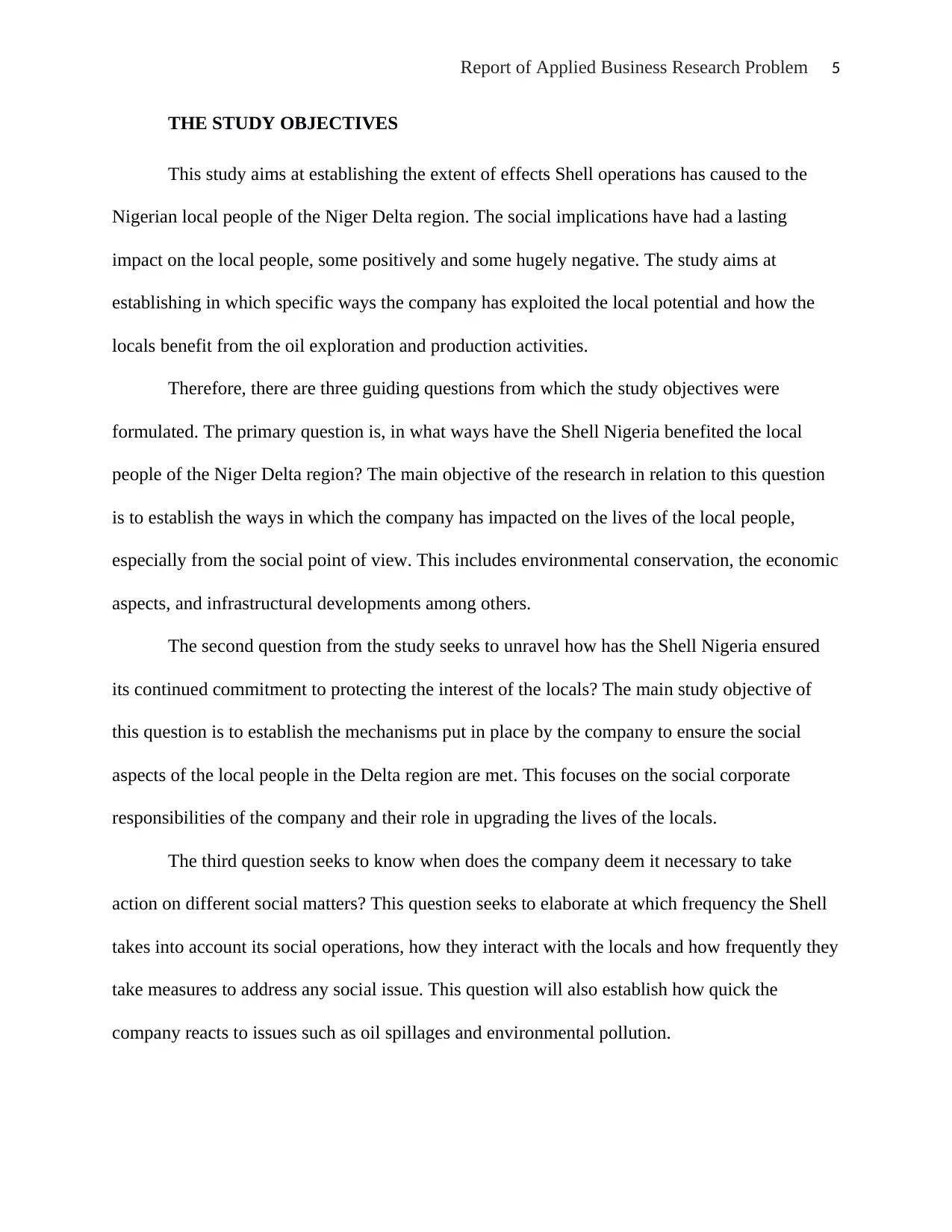
Report of Applied Business Research Problem 5
THE STUDY OBJECTIVES
This study aims at establishing the extent of effects Shell operations has caused to the
Nigerian local people of the Niger Delta region. The social implications have had a lasting
impact on the local people, some positively and some hugely negative. The study aims at
establishing in which specific ways the company has exploited the local potential and how the
locals benefit from the oil exploration and production activities.
Therefore, there are three guiding questions from which the study objectives were
formulated. The primary question is, in what ways have the Shell Nigeria benefited the local
people of the Niger Delta region? The main objective of the research in relation to this question
is to establish the ways in which the company has impacted on the lives of the local people,
especially from the social point of view. This includes environmental conservation, the economic
aspects, and infrastructural developments among others.
The second question from the study seeks to unravel how has the Shell Nigeria ensured
its continued commitment to protecting the interest of the locals? The main study objective of
this question is to establish the mechanisms put in place by the company to ensure the social
aspects of the local people in the Delta region are met. This focuses on the social corporate
responsibilities of the company and their role in upgrading the lives of the locals.
The third question seeks to know when does the company deem it necessary to take
action on different social matters? This question seeks to elaborate at which frequency the Shell
takes into account its social operations, how they interact with the locals and how frequently they
take measures to address any social issue. This question will also establish how quick the
company reacts to issues such as oil spillages and environmental pollution.
THE STUDY OBJECTIVES
This study aims at establishing the extent of effects Shell operations has caused to the
Nigerian local people of the Niger Delta region. The social implications have had a lasting
impact on the local people, some positively and some hugely negative. The study aims at
establishing in which specific ways the company has exploited the local potential and how the
locals benefit from the oil exploration and production activities.
Therefore, there are three guiding questions from which the study objectives were
formulated. The primary question is, in what ways have the Shell Nigeria benefited the local
people of the Niger Delta region? The main objective of the research in relation to this question
is to establish the ways in which the company has impacted on the lives of the local people,
especially from the social point of view. This includes environmental conservation, the economic
aspects, and infrastructural developments among others.
The second question from the study seeks to unravel how has the Shell Nigeria ensured
its continued commitment to protecting the interest of the locals? The main study objective of
this question is to establish the mechanisms put in place by the company to ensure the social
aspects of the local people in the Delta region are met. This focuses on the social corporate
responsibilities of the company and their role in upgrading the lives of the locals.
The third question seeks to know when does the company deem it necessary to take
action on different social matters? This question seeks to elaborate at which frequency the Shell
takes into account its social operations, how they interact with the locals and how frequently they
take measures to address any social issue. This question will also establish how quick the
company reacts to issues such as oil spillages and environmental pollution.
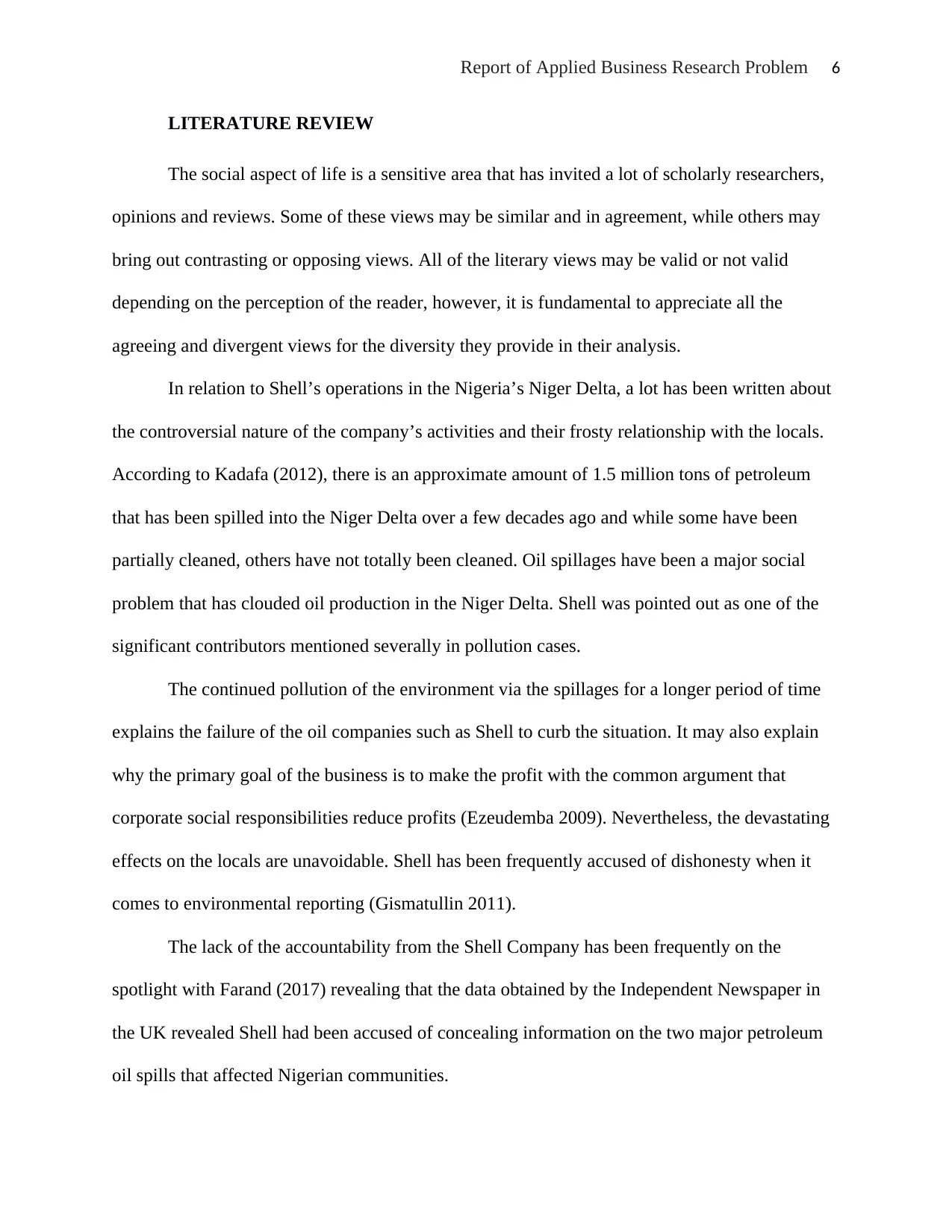
Report of Applied Business Research Problem 6
LITERATURE REVIEW
The social aspect of life is a sensitive area that has invited a lot of scholarly researchers,
opinions and reviews. Some of these views may be similar and in agreement, while others may
bring out contrasting or opposing views. All of the literary views may be valid or not valid
depending on the perception of the reader, however, it is fundamental to appreciate all the
agreeing and divergent views for the diversity they provide in their analysis.
In relation to Shell’s operations in the Nigeria’s Niger Delta, a lot has been written about
the controversial nature of the company’s activities and their frosty relationship with the locals.
According to Kadafa (2012), there is an approximate amount of 1.5 million tons of petroleum
that has been spilled into the Niger Delta over a few decades ago and while some have been
partially cleaned, others have not totally been cleaned. Oil spillages have been a major social
problem that has clouded oil production in the Niger Delta. Shell was pointed out as one of the
significant contributors mentioned severally in pollution cases.
The continued pollution of the environment via the spillages for a longer period of time
explains the failure of the oil companies such as Shell to curb the situation. It may also explain
why the primary goal of the business is to make the profit with the common argument that
corporate social responsibilities reduce profits (Ezeudemba 2009). Nevertheless, the devastating
effects on the locals are unavoidable. Shell has been frequently accused of dishonesty when it
comes to environmental reporting (Gismatullin 2011).
The lack of the accountability from the Shell Company has been frequently on the
spotlight with Farand (2017) revealing that the data obtained by the Independent Newspaper in
the UK revealed Shell had been accused of concealing information on the two major petroleum
oil spills that affected Nigerian communities.
LITERATURE REVIEW
The social aspect of life is a sensitive area that has invited a lot of scholarly researchers,
opinions and reviews. Some of these views may be similar and in agreement, while others may
bring out contrasting or opposing views. All of the literary views may be valid or not valid
depending on the perception of the reader, however, it is fundamental to appreciate all the
agreeing and divergent views for the diversity they provide in their analysis.
In relation to Shell’s operations in the Nigeria’s Niger Delta, a lot has been written about
the controversial nature of the company’s activities and their frosty relationship with the locals.
According to Kadafa (2012), there is an approximate amount of 1.5 million tons of petroleum
that has been spilled into the Niger Delta over a few decades ago and while some have been
partially cleaned, others have not totally been cleaned. Oil spillages have been a major social
problem that has clouded oil production in the Niger Delta. Shell was pointed out as one of the
significant contributors mentioned severally in pollution cases.
The continued pollution of the environment via the spillages for a longer period of time
explains the failure of the oil companies such as Shell to curb the situation. It may also explain
why the primary goal of the business is to make the profit with the common argument that
corporate social responsibilities reduce profits (Ezeudemba 2009). Nevertheless, the devastating
effects on the locals are unavoidable. Shell has been frequently accused of dishonesty when it
comes to environmental reporting (Gismatullin 2011).
The lack of the accountability from the Shell Company has been frequently on the
spotlight with Farand (2017) revealing that the data obtained by the Independent Newspaper in
the UK revealed Shell had been accused of concealing information on the two major petroleum
oil spills that affected Nigerian communities.
⊘ This is a preview!⊘
Do you want full access?
Subscribe today to unlock all pages.

Trusted by 1+ million students worldwide
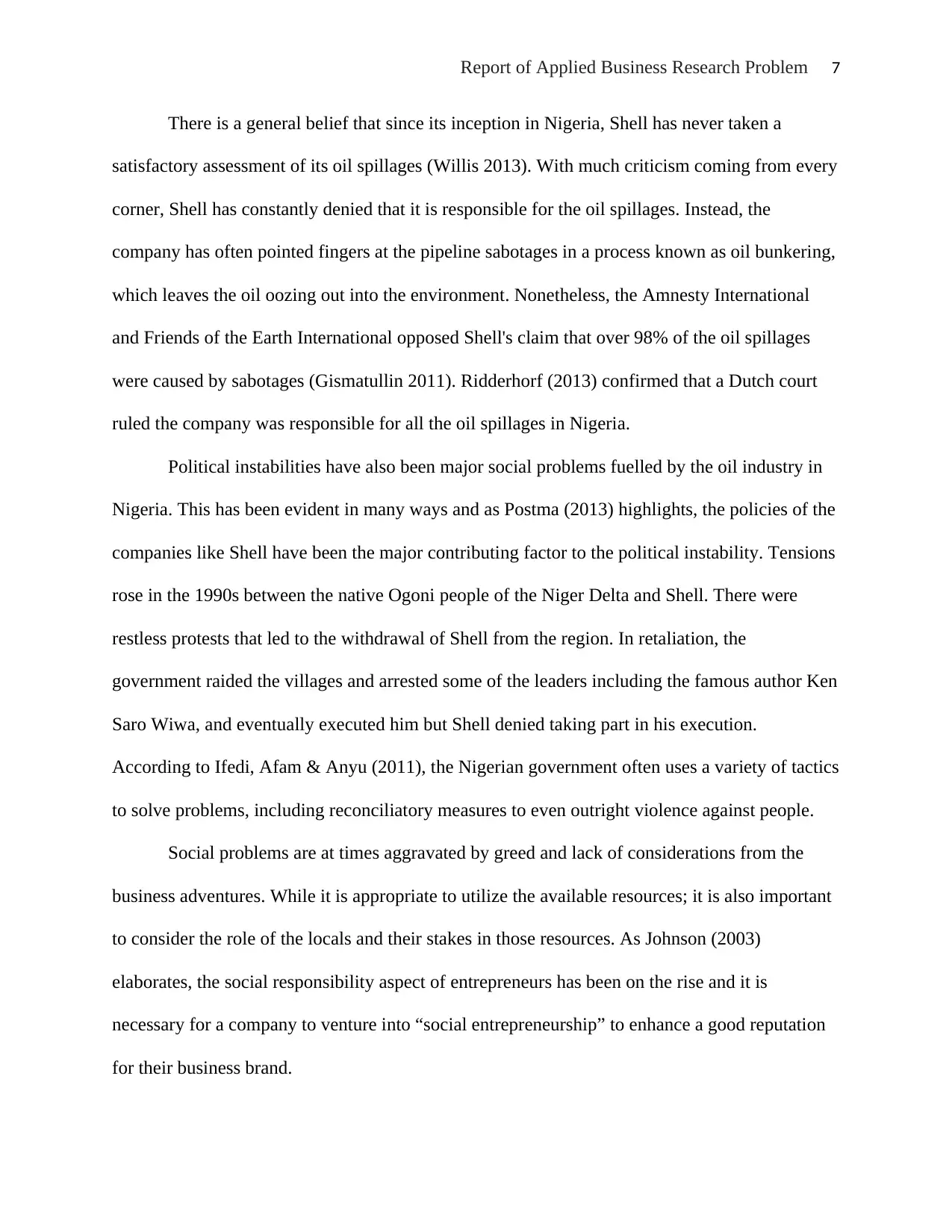
Report of Applied Business Research Problem 7
There is a general belief that since its inception in Nigeria, Shell has never taken a
satisfactory assessment of its oil spillages (Willis 2013). With much criticism coming from every
corner, Shell has constantly denied that it is responsible for the oil spillages. Instead, the
company has often pointed fingers at the pipeline sabotages in a process known as oil bunkering,
which leaves the oil oozing out into the environment. Nonetheless, the Amnesty International
and Friends of the Earth International opposed Shell's claim that over 98% of the oil spillages
were caused by sabotages (Gismatullin 2011). Ridderhorf (2013) confirmed that a Dutch court
ruled the company was responsible for all the oil spillages in Nigeria.
Political instabilities have also been major social problems fuelled by the oil industry in
Nigeria. This has been evident in many ways and as Postma (2013) highlights, the policies of the
companies like Shell have been the major contributing factor to the political instability. Tensions
rose in the 1990s between the native Ogoni people of the Niger Delta and Shell. There were
restless protests that led to the withdrawal of Shell from the region. In retaliation, the
government raided the villages and arrested some of the leaders including the famous author Ken
Saro Wiwa, and eventually executed him but Shell denied taking part in his execution.
According to Ifedi, Afam & Anyu (2011), the Nigerian government often uses a variety of tactics
to solve problems, including reconciliatory measures to even outright violence against people.
Social problems are at times aggravated by greed and lack of considerations from the
business adventures. While it is appropriate to utilize the available resources; it is also important
to consider the role of the locals and their stakes in those resources. As Johnson (2003)
elaborates, the social responsibility aspect of entrepreneurs has been on the rise and it is
necessary for a company to venture into “social entrepreneurship” to enhance a good reputation
for their business brand.
There is a general belief that since its inception in Nigeria, Shell has never taken a
satisfactory assessment of its oil spillages (Willis 2013). With much criticism coming from every
corner, Shell has constantly denied that it is responsible for the oil spillages. Instead, the
company has often pointed fingers at the pipeline sabotages in a process known as oil bunkering,
which leaves the oil oozing out into the environment. Nonetheless, the Amnesty International
and Friends of the Earth International opposed Shell's claim that over 98% of the oil spillages
were caused by sabotages (Gismatullin 2011). Ridderhorf (2013) confirmed that a Dutch court
ruled the company was responsible for all the oil spillages in Nigeria.
Political instabilities have also been major social problems fuelled by the oil industry in
Nigeria. This has been evident in many ways and as Postma (2013) highlights, the policies of the
companies like Shell have been the major contributing factor to the political instability. Tensions
rose in the 1990s between the native Ogoni people of the Niger Delta and Shell. There were
restless protests that led to the withdrawal of Shell from the region. In retaliation, the
government raided the villages and arrested some of the leaders including the famous author Ken
Saro Wiwa, and eventually executed him but Shell denied taking part in his execution.
According to Ifedi, Afam & Anyu (2011), the Nigerian government often uses a variety of tactics
to solve problems, including reconciliatory measures to even outright violence against people.
Social problems are at times aggravated by greed and lack of considerations from the
business adventures. While it is appropriate to utilize the available resources; it is also important
to consider the role of the locals and their stakes in those resources. As Johnson (2003)
elaborates, the social responsibility aspect of entrepreneurs has been on the rise and it is
necessary for a company to venture into “social entrepreneurship” to enhance a good reputation
for their business brand.
Paraphrase This Document
Need a fresh take? Get an instant paraphrase of this document with our AI Paraphraser
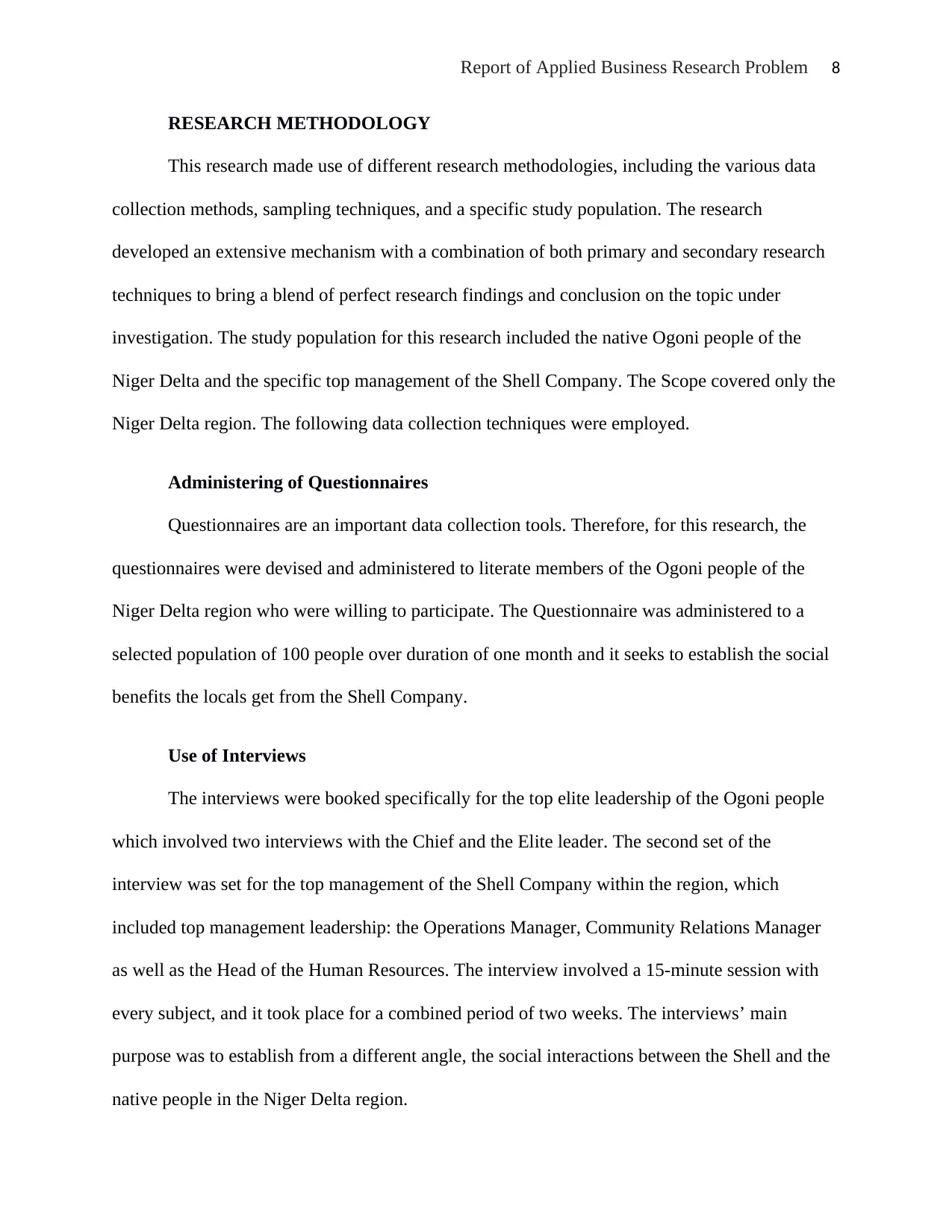
Report of Applied Business Research Problem 8
RESEARCH METHODOLOGY
This research made use of different research methodologies, including the various data
collection methods, sampling techniques, and a specific study population. The research
developed an extensive mechanism with a combination of both primary and secondary research
techniques to bring a blend of perfect research findings and conclusion on the topic under
investigation. The study population for this research included the native Ogoni people of the
Niger Delta and the specific top management of the Shell Company. The Scope covered only the
Niger Delta region. The following data collection techniques were employed.
Administering of Questionnaires
Questionnaires are an important data collection tools. Therefore, for this research, the
questionnaires were devised and administered to literate members of the Ogoni people of the
Niger Delta region who were willing to participate. The Questionnaire was administered to a
selected population of 100 people over duration of one month and it seeks to establish the social
benefits the locals get from the Shell Company.
Use of Interviews
The interviews were booked specifically for the top elite leadership of the Ogoni people
which involved two interviews with the Chief and the Elite leader. The second set of the
interview was set for the top management of the Shell Company within the region, which
included top management leadership: the Operations Manager, Community Relations Manager
as well as the Head of the Human Resources. The interview involved a 15-minute session with
every subject, and it took place for a combined period of two weeks. The interviews’ main
purpose was to establish from a different angle, the social interactions between the Shell and the
native people in the Niger Delta region.
RESEARCH METHODOLOGY
This research made use of different research methodologies, including the various data
collection methods, sampling techniques, and a specific study population. The research
developed an extensive mechanism with a combination of both primary and secondary research
techniques to bring a blend of perfect research findings and conclusion on the topic under
investigation. The study population for this research included the native Ogoni people of the
Niger Delta and the specific top management of the Shell Company. The Scope covered only the
Niger Delta region. The following data collection techniques were employed.
Administering of Questionnaires
Questionnaires are an important data collection tools. Therefore, for this research, the
questionnaires were devised and administered to literate members of the Ogoni people of the
Niger Delta region who were willing to participate. The Questionnaire was administered to a
selected population of 100 people over duration of one month and it seeks to establish the social
benefits the locals get from the Shell Company.
Use of Interviews
The interviews were booked specifically for the top elite leadership of the Ogoni people
which involved two interviews with the Chief and the Elite leader. The second set of the
interview was set for the top management of the Shell Company within the region, which
included top management leadership: the Operations Manager, Community Relations Manager
as well as the Head of the Human Resources. The interview involved a 15-minute session with
every subject, and it took place for a combined period of two weeks. The interviews’ main
purpose was to establish from a different angle, the social interactions between the Shell and the
native people in the Niger Delta region.
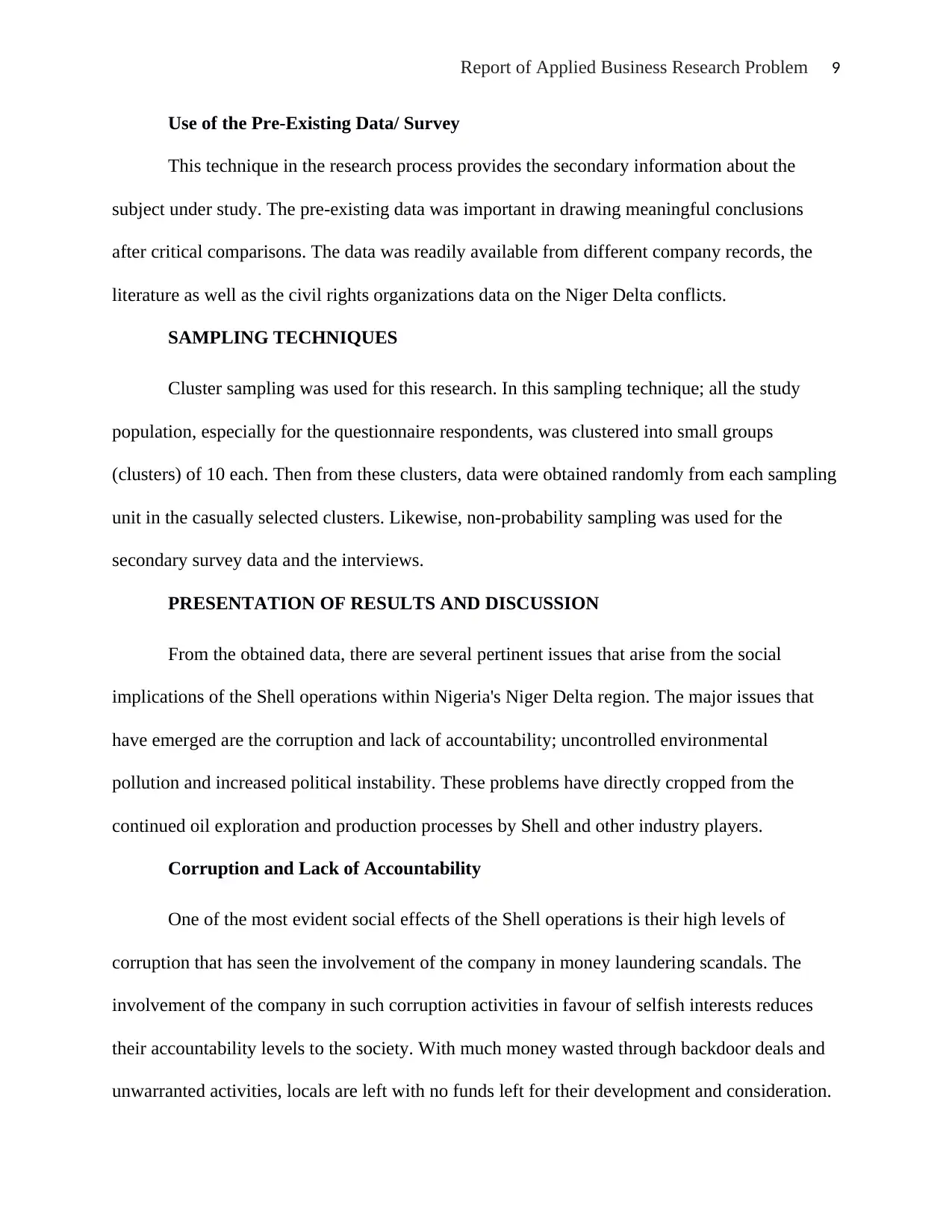
Report of Applied Business Research Problem 9
Use of the Pre-Existing Data/ Survey
This technique in the research process provides the secondary information about the
subject under study. The pre-existing data was important in drawing meaningful conclusions
after critical comparisons. The data was readily available from different company records, the
literature as well as the civil rights organizations data on the Niger Delta conflicts.
SAMPLING TECHNIQUES
Cluster sampling was used for this research. In this sampling technique; all the study
population, especially for the questionnaire respondents, was clustered into small groups
(clusters) of 10 each. Then from these clusters, data were obtained randomly from each sampling
unit in the casually selected clusters. Likewise, non-probability sampling was used for the
secondary survey data and the interviews.
PRESENTATION OF RESULTS AND DISCUSSION
From the obtained data, there are several pertinent issues that arise from the social
implications of the Shell operations within Nigeria's Niger Delta region. The major issues that
have emerged are the corruption and lack of accountability; uncontrolled environmental
pollution and increased political instability. These problems have directly cropped from the
continued oil exploration and production processes by Shell and other industry players.
Corruption and Lack of Accountability
One of the most evident social effects of the Shell operations is their high levels of
corruption that has seen the involvement of the company in money laundering scandals. The
involvement of the company in such corruption activities in favour of selfish interests reduces
their accountability levels to the society. With much money wasted through backdoor deals and
unwarranted activities, locals are left with no funds left for their development and consideration.
Use of the Pre-Existing Data/ Survey
This technique in the research process provides the secondary information about the
subject under study. The pre-existing data was important in drawing meaningful conclusions
after critical comparisons. The data was readily available from different company records, the
literature as well as the civil rights organizations data on the Niger Delta conflicts.
SAMPLING TECHNIQUES
Cluster sampling was used for this research. In this sampling technique; all the study
population, especially for the questionnaire respondents, was clustered into small groups
(clusters) of 10 each. Then from these clusters, data were obtained randomly from each sampling
unit in the casually selected clusters. Likewise, non-probability sampling was used for the
secondary survey data and the interviews.
PRESENTATION OF RESULTS AND DISCUSSION
From the obtained data, there are several pertinent issues that arise from the social
implications of the Shell operations within Nigeria's Niger Delta region. The major issues that
have emerged are the corruption and lack of accountability; uncontrolled environmental
pollution and increased political instability. These problems have directly cropped from the
continued oil exploration and production processes by Shell and other industry players.
Corruption and Lack of Accountability
One of the most evident social effects of the Shell operations is their high levels of
corruption that has seen the involvement of the company in money laundering scandals. The
involvement of the company in such corruption activities in favour of selfish interests reduces
their accountability levels to the society. With much money wasted through backdoor deals and
unwarranted activities, locals are left with no funds left for their development and consideration.
⊘ This is a preview!⊘
Do you want full access?
Subscribe today to unlock all pages.

Trusted by 1+ million students worldwide
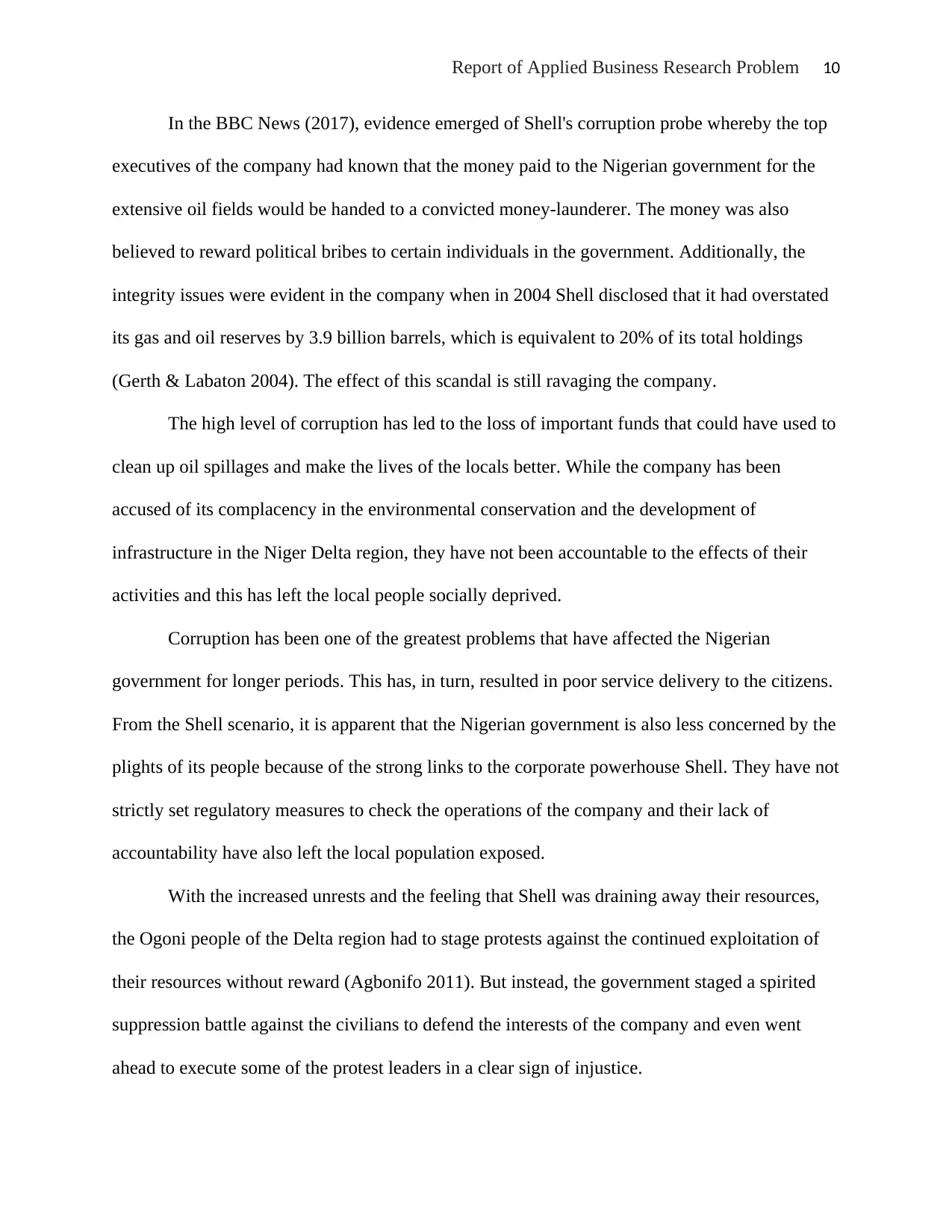
Report of Applied Business Research Problem 10
In the BBC News (2017), evidence emerged of Shell's corruption probe whereby the top
executives of the company had known that the money paid to the Nigerian government for the
extensive oil fields would be handed to a convicted money-launderer. The money was also
believed to reward political bribes to certain individuals in the government. Additionally, the
integrity issues were evident in the company when in 2004 Shell disclosed that it had overstated
its gas and oil reserves by 3.9 billion barrels, which is equivalent to 20% of its total holdings
(Gerth & Labaton 2004). The effect of this scandal is still ravaging the company.
The high level of corruption has led to the loss of important funds that could have used to
clean up oil spillages and make the lives of the locals better. While the company has been
accused of its complacency in the environmental conservation and the development of
infrastructure in the Niger Delta region, they have not been accountable to the effects of their
activities and this has left the local people socially deprived.
Corruption has been one of the greatest problems that have affected the Nigerian
government for longer periods. This has, in turn, resulted in poor service delivery to the citizens.
From the Shell scenario, it is apparent that the Nigerian government is also less concerned by the
plights of its people because of the strong links to the corporate powerhouse Shell. They have not
strictly set regulatory measures to check the operations of the company and their lack of
accountability have also left the local population exposed.
With the increased unrests and the feeling that Shell was draining away their resources,
the Ogoni people of the Delta region had to stage protests against the continued exploitation of
their resources without reward (Agbonifo 2011). But instead, the government staged a spirited
suppression battle against the civilians to defend the interests of the company and even went
ahead to execute some of the protest leaders in a clear sign of injustice.
In the BBC News (2017), evidence emerged of Shell's corruption probe whereby the top
executives of the company had known that the money paid to the Nigerian government for the
extensive oil fields would be handed to a convicted money-launderer. The money was also
believed to reward political bribes to certain individuals in the government. Additionally, the
integrity issues were evident in the company when in 2004 Shell disclosed that it had overstated
its gas and oil reserves by 3.9 billion barrels, which is equivalent to 20% of its total holdings
(Gerth & Labaton 2004). The effect of this scandal is still ravaging the company.
The high level of corruption has led to the loss of important funds that could have used to
clean up oil spillages and make the lives of the locals better. While the company has been
accused of its complacency in the environmental conservation and the development of
infrastructure in the Niger Delta region, they have not been accountable to the effects of their
activities and this has left the local people socially deprived.
Corruption has been one of the greatest problems that have affected the Nigerian
government for longer periods. This has, in turn, resulted in poor service delivery to the citizens.
From the Shell scenario, it is apparent that the Nigerian government is also less concerned by the
plights of its people because of the strong links to the corporate powerhouse Shell. They have not
strictly set regulatory measures to check the operations of the company and their lack of
accountability have also left the local population exposed.
With the increased unrests and the feeling that Shell was draining away their resources,
the Ogoni people of the Delta region had to stage protests against the continued exploitation of
their resources without reward (Agbonifo 2011). But instead, the government staged a spirited
suppression battle against the civilians to defend the interests of the company and even went
ahead to execute some of the protest leaders in a clear sign of injustice.
Paraphrase This Document
Need a fresh take? Get an instant paraphrase of this document with our AI Paraphraser
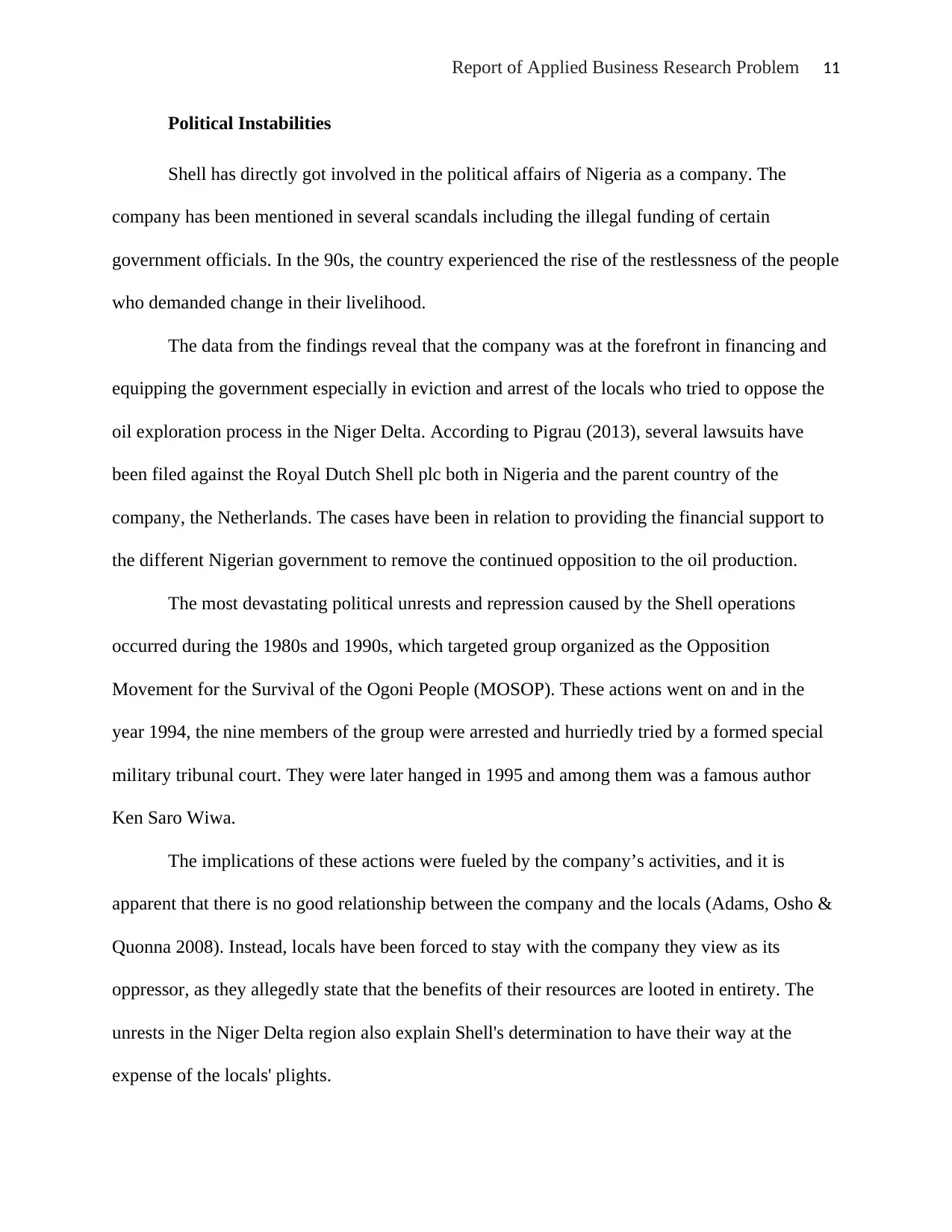
Report of Applied Business Research Problem 11
Political Instabilities
Shell has directly got involved in the political affairs of Nigeria as a company. The
company has been mentioned in several scandals including the illegal funding of certain
government officials. In the 90s, the country experienced the rise of the restlessness of the people
who demanded change in their livelihood.
The data from the findings reveal that the company was at the forefront in financing and
equipping the government especially in eviction and arrest of the locals who tried to oppose the
oil exploration process in the Niger Delta. According to Pigrau (2013), several lawsuits have
been filed against the Royal Dutch Shell plc both in Nigeria and the parent country of the
company, the Netherlands. The cases have been in relation to providing the financial support to
the different Nigerian government to remove the continued opposition to the oil production.
The most devastating political unrests and repression caused by the Shell operations
occurred during the 1980s and 1990s, which targeted group organized as the Opposition
Movement for the Survival of the Ogoni People (MOSOP). These actions went on and in the
year 1994, the nine members of the group were arrested and hurriedly tried by a formed special
military tribunal court. They were later hanged in 1995 and among them was a famous author
Ken Saro Wiwa.
The implications of these actions were fueled by the company’s activities, and it is
apparent that there is no good relationship between the company and the locals (Adams, Osho &
Quonna 2008). Instead, locals have been forced to stay with the company they view as its
oppressor, as they allegedly state that the benefits of their resources are looted in entirety. The
unrests in the Niger Delta region also explain Shell's determination to have their way at the
expense of the locals' plights.
Political Instabilities
Shell has directly got involved in the political affairs of Nigeria as a company. The
company has been mentioned in several scandals including the illegal funding of certain
government officials. In the 90s, the country experienced the rise of the restlessness of the people
who demanded change in their livelihood.
The data from the findings reveal that the company was at the forefront in financing and
equipping the government especially in eviction and arrest of the locals who tried to oppose the
oil exploration process in the Niger Delta. According to Pigrau (2013), several lawsuits have
been filed against the Royal Dutch Shell plc both in Nigeria and the parent country of the
company, the Netherlands. The cases have been in relation to providing the financial support to
the different Nigerian government to remove the continued opposition to the oil production.
The most devastating political unrests and repression caused by the Shell operations
occurred during the 1980s and 1990s, which targeted group organized as the Opposition
Movement for the Survival of the Ogoni People (MOSOP). These actions went on and in the
year 1994, the nine members of the group were arrested and hurriedly tried by a formed special
military tribunal court. They were later hanged in 1995 and among them was a famous author
Ken Saro Wiwa.
The implications of these actions were fueled by the company’s activities, and it is
apparent that there is no good relationship between the company and the locals (Adams, Osho &
Quonna 2008). Instead, locals have been forced to stay with the company they view as its
oppressor, as they allegedly state that the benefits of their resources are looted in entirety. The
unrests in the Niger Delta region also explain Shell's determination to have their way at the
expense of the locals' plights.
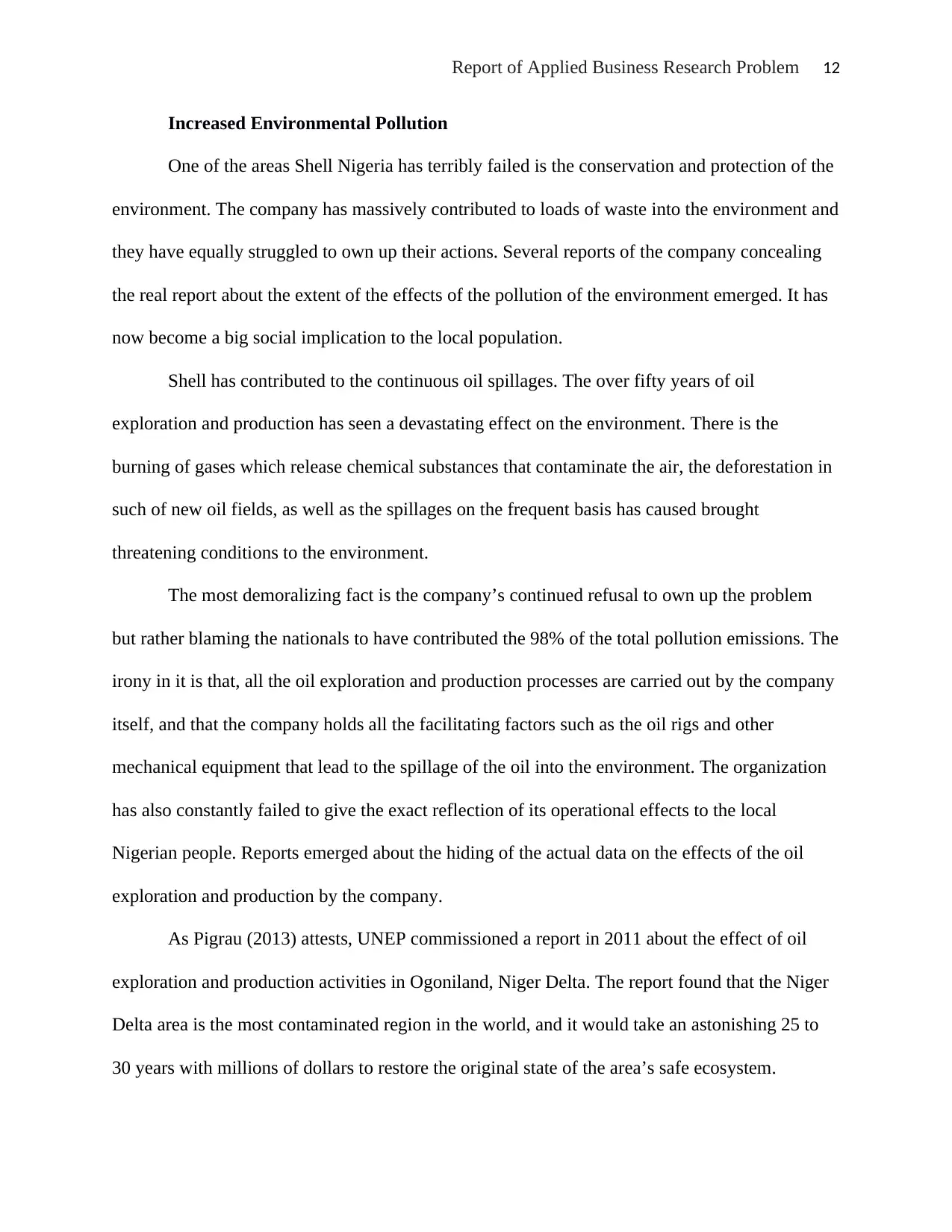
Report of Applied Business Research Problem 12
Increased Environmental Pollution
One of the areas Shell Nigeria has terribly failed is the conservation and protection of the
environment. The company has massively contributed to loads of waste into the environment and
they have equally struggled to own up their actions. Several reports of the company concealing
the real report about the extent of the effects of the pollution of the environment emerged. It has
now become a big social implication to the local population.
Shell has contributed to the continuous oil spillages. The over fifty years of oil
exploration and production has seen a devastating effect on the environment. There is the
burning of gases which release chemical substances that contaminate the air, the deforestation in
such of new oil fields, as well as the spillages on the frequent basis has caused brought
threatening conditions to the environment.
The most demoralizing fact is the company’s continued refusal to own up the problem
but rather blaming the nationals to have contributed the 98% of the total pollution emissions. The
irony in it is that, all the oil exploration and production processes are carried out by the company
itself, and that the company holds all the facilitating factors such as the oil rigs and other
mechanical equipment that lead to the spillage of the oil into the environment. The organization
has also constantly failed to give the exact reflection of its operational effects to the local
Nigerian people. Reports emerged about the hiding of the actual data on the effects of the oil
exploration and production by the company.
As Pigrau (2013) attests, UNEP commissioned a report in 2011 about the effect of oil
exploration and production activities in Ogoniland, Niger Delta. The report found that the Niger
Delta area is the most contaminated region in the world, and it would take an astonishing 25 to
30 years with millions of dollars to restore the original state of the area’s safe ecosystem.
Increased Environmental Pollution
One of the areas Shell Nigeria has terribly failed is the conservation and protection of the
environment. The company has massively contributed to loads of waste into the environment and
they have equally struggled to own up their actions. Several reports of the company concealing
the real report about the extent of the effects of the pollution of the environment emerged. It has
now become a big social implication to the local population.
Shell has contributed to the continuous oil spillages. The over fifty years of oil
exploration and production has seen a devastating effect on the environment. There is the
burning of gases which release chemical substances that contaminate the air, the deforestation in
such of new oil fields, as well as the spillages on the frequent basis has caused brought
threatening conditions to the environment.
The most demoralizing fact is the company’s continued refusal to own up the problem
but rather blaming the nationals to have contributed the 98% of the total pollution emissions. The
irony in it is that, all the oil exploration and production processes are carried out by the company
itself, and that the company holds all the facilitating factors such as the oil rigs and other
mechanical equipment that lead to the spillage of the oil into the environment. The organization
has also constantly failed to give the exact reflection of its operational effects to the local
Nigerian people. Reports emerged about the hiding of the actual data on the effects of the oil
exploration and production by the company.
As Pigrau (2013) attests, UNEP commissioned a report in 2011 about the effect of oil
exploration and production activities in Ogoniland, Niger Delta. The report found that the Niger
Delta area is the most contaminated region in the world, and it would take an astonishing 25 to
30 years with millions of dollars to restore the original state of the area’s safe ecosystem.
⊘ This is a preview!⊘
Do you want full access?
Subscribe today to unlock all pages.

Trusted by 1+ million students worldwide
1 out of 16
Related Documents
Your All-in-One AI-Powered Toolkit for Academic Success.
+13062052269
info@desklib.com
Available 24*7 on WhatsApp / Email
![[object Object]](/_next/static/media/star-bottom.7253800d.svg)
Unlock your academic potential
Copyright © 2020–2026 A2Z Services. All Rights Reserved. Developed and managed by ZUCOL.





